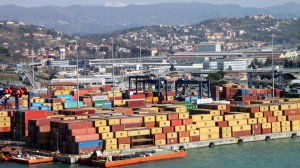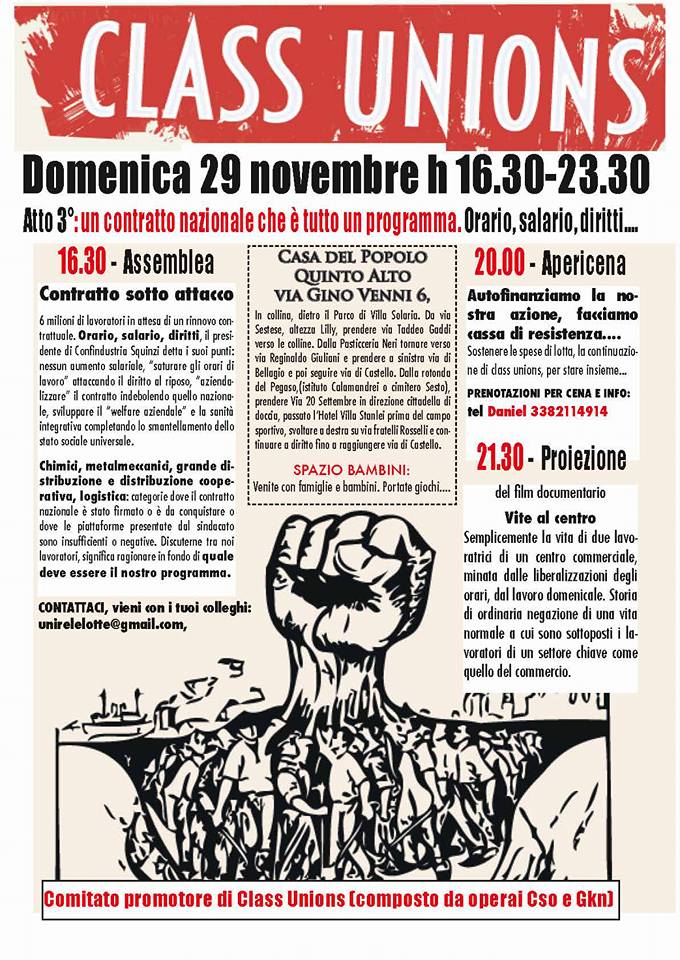For a Europe-wide coordination in the Transport-Logistics sector
 In the last decades the concentration process advanced in the transport sector, with the establishment of logistic centres in belts around cities, with hundreds of thousand workers in each major country. In Europe there are more than 10 million workers overall in this sector, of which 5.7 million in land transport, 2.8 million in warehousing and logistics, and 1.75 million in private carriers and postal delivery services (of which in Italy: 537.000, 248.000 and 180.000 respectively – Eurostat data for the first quarter of 2015).
In the last decades the concentration process advanced in the transport sector, with the establishment of logistic centres in belts around cities, with hundreds of thousand workers in each major country. In Europe there are more than 10 million workers overall in this sector, of which 5.7 million in land transport, 2.8 million in warehousing and logistics, and 1.75 million in private carriers and postal delivery services (of which in Italy: 537.000, 248.000 and 180.000 respectively – Eurostat data for the first quarter of 2015).
Workers in this sector in Italy are among the most exploited and less paid workers: in logistic warehouses they carry on heavy jobs, which wear out workers’ physical capabilities and very often make them disabled for physical work, but with no recognition of their disability pension. In the transport sector European rules on compulsory rest are often dodged, and drivers are compelled to work long hours up to the physical and psychical extreme limits, with great danger for their safety and depriving them of free time and the possibility of carrying on a normal life and entertaining personal relations.
For both warehouse and transport personnel (porters and drivers), companies in Italy have hired mostly immigrant workers in order to lower wages: the most widespread method is the use of intermediaries, established under the legal status of ‘cooperatives’ which, thanks to a favourable legislation, allows them to make exceptions to national labour contract provisions such as paid sick and injury leave payment, more flexible work hours, eliminating overtime pay, lower payment of holidays, leaves and year-end bonus, and pay reduction in case of declaration of ‘crisis status’.
Moreover, in most warehouses where workers are not organised or where only official trade unions are present, workers are classified in lower wage levels than due, overtime hours are not paid as overtime or are not paid at all, or even ordinary hours are paid in the black without contributions, drivers are not paid or only partially paid travelling allowances. This is compounded by despotic, semi-slavery HR systems, offending workers’ dignity.
Given Italy’s legislation and juridical system, with the minority of workers who claim their rights through legal action, employers’ maximum risk is paying what was due, therefore violating workers’ rights is always convenient. A widespread practice is the opening and closing of so-called cooperatives within one year or so, often with bankruptcy procedure, in order not to pay workers the last wage and severance pay. Besides evading contributions, there also is widespread tax dodging. The Revenue Guard Corps recently discovered a tax-dodging scheme by a consortium of cooperatives for an amount up to 1.5 billion (sic!) euros.
The branch of logistic cooperatives has become such a business that it has attracted organised crime: Mafia, N’dragheta, Camorra and the like, which also use it for money laundering and often gets into close financial relationships with big international logistic companies.
In the transport sector, official trade unions are, more than yielding, often corrupt and accomplices with contracting companies and the cooperatives’ bosses; in an increasing number of cases we find former trade union officials at the opposite side of the table as employers, both in traditional cooperatives and in new ones with mafia-like presence.
SI Cobas and ADL Cobas have been engaged for several years in organizing workers in this sector, and in the hundreds of warehouses where workers are organized their conditions have thoroughly changed, with actual wage rate increases mostly in the range of +50% – +100%, together with work hours reduction and improvement in working conditions, starting with the respect of workers’ persons. These results have been achieved in most cases through hard struggles, generally by means of strikes and blockage of vehicles entering or leaving warehouses, and at the cost of company repression (sackings, lock-outs) and state repression, struggles in which workers have raised their heads and have become more militant.
In this activity thousands of workers have been organized, mainly in the sector’s leading groups (TNT, GLS, DHL, SDA, BRT), in whose main hubs SI Cobas and ADL Cobas members are a majority, but the majority of the sector’s workers still need to organize. In the last months activity has extended from logistic to transport workers. Geographically, the movement arose in the area around Milan and in Italy’s Northeast, and has spread to most of Northern and Central Italy, and now is reaching the South (where most of workers are Italian).
In big companies we have achieved national labor agreements, which replace the ones signed by the official trade unions CGIL, CISL and UIL, which, in order to catch up, have now put some of our claims in their package of requests.
In October 2015 SI Cobas and ADL Cobas have presented their requests for the renewal of the sector’s labor agreement, expiring at yearend, and the first national strike is planned for October 29, in connection with the international weeks of mobilization and struggle called by the International Trade Union Network of Solidarity and Struggle. Among the requests is the reduction of working hours from 39 to 37.5 per week, measures to protect workers’ health against physical wear due to overwork and guarantees for disabled workers, as well as job guarantees in case of change of contractor.
The struggle og logistic workers in Italy has an immediate international character: on the one hand because workers come from dozens of countries of all continents, and in struggles they united between them and with local workers, overcoming national divides, on the other hand because transport is international by nature. Many hubs in Italy also serve other countries in Southern
Europe and the Mediterranean, and often companies threaten to move their warehouses to other countries. Moreover, with Europe-wide liberalization of transport, a competition has started between carriers, largely based on lowering wages through legal and illegal means, the over-exploitation of drivers (mostly immigrants) who are imposed exhausting hours of work beyond any legal limit, in violation of rules on compulsory rest and dodging controls in manifold ways, and by using companies based in low-wage countries in violation of European limits to cabotage.
A coordinated action in different European countries can strongly reduce competition between workers and the bosses’ ability to divide and blackmail workers and lower wages. We therefore propose to work to set up a European co-ordination between logistic and transport workers, also beyond our European Network member unions, on the basis of the willingness to wage common struggles for the improvement of workers’ conditions.
























